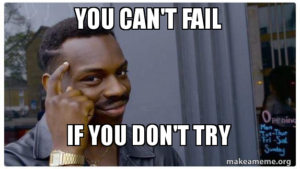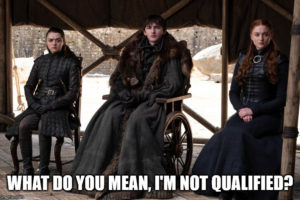Following on from the post on how to give feedback, I’ve been thinking about having the confidence to read aloud, and the role gender plays in this. There’s a fascinating Ted Talk by Reshma Saujani on this subject.
Saujani suggests that girls are socialised to avoid risk and failure, to play it safe, get top marks, while boys are taught to aim high, jump in, play rough, give it a go.
“We’re raising our girls to be perfect and we’re raising our boys to be brave.”

She cites a study done with bright 5th graders who were presented with an assignment that was too difficult for them. At this level, girls routinely outperform boys in every subject. But even so, the study found that the higher their IQ, the more likely the girls were to quit, while the boys were more likely to try harder and therefore did better overall.
Saujani runs computer coding classes for kids and she says the teachers continually encounter the same thing – when girls call for help, the teachers find them staring at a blank screen. If they hit ‘undo’, they find the girls have deleted their work, preferring to present nothing than present something flawed.

It’s “perfection or bust”.
This effect is exacerbated as they get older. She says that girls are uncomfortable with imperfection, and as a result they’re underrepresented in certain careers, gravitating towards careers that are safer options, while men are habituated to take more risks and are rewarded for it. Men are more likely to ask for pay raises, for example, and studies show that women won’t even apply for jobs unless they meet 100% of the criteria, while men will happily blag their way into interviews with only 60%.

Obviously a major overhaul of the system is required here, but in the meantime you can help insecure kids by creating an atmosphere where bravery, rather than perfection is praised, and where notions of right/wrong, good/bad are distanced from creative work.
In fact, it’s really important that creativity is distanced from ideas about right/wrong. Perfection is the enemy of creativity. Innovation requires imperfection, perseverance, bravery, rule breaking. If your goal is perfection then it makes sense not to take any risks, not to try anything new, and as a result you never create anything original. Add that to lack of confidence and low self-esteem and you may have a kid whose ideas just never make it to the page at all.
This resonates with me because, though I’ve always written, the first time I told any of my family or friends about it, was when I was able to say, ‘My writing has been chosen for a major competition and is going to be mentioned in The Times.’ At that point, I’d already succeeded, but there was no way I’d ever have admitted I was trying to do something I might fail at.
There was no writing group at my school, which helped me to keep my writing very secret (this was in the 90s, I believe there is one there now, yay!). In my undistinguished school career, the one and only prize day I ever had to attend was when I won a GCSE prize for English. In my diary after the event I noted that in the headmaster’s speech he talked about rugby for 27 minutes. Sports were big at my school, especially rugby, which was only for boys (I think they now have a girls team too, yay!). Even now, more boys participate in sports than girls. And sports, when you think about it, are brilliant lessons in being brave, imperfect, losing in front of huge crowds, shrugging it off and moving on to the next match.
What did I do after school? I was in the choir, (mostly girls), where we produced one-off, note-perfect performances of operas and Christmas carols. I sang with them for seven years and to this day I won’t sing alone in public in case I embarrass myself.


If you look, you’ll see this everywhere. Even in Kids Lit. I am all for the reinvention of female characters from timid sidekicks who make the sandwiches for picnics and require constant rescuing, to the feisty, kick-ass protagonists of today. But…
Do they all have to be feisty, kick-ass protagonists? Like it’s not OK to be a mess? To fail?

(I’m digressing, but if you’re interested, I wrote another blog post on this here)
It may be worth thinking about our afterschool clubs and whether girls are gravitating more towards perfection-oriented activities while boys go for risk-taking activities. At our writing group we’ve always had more girls than boys, and I think you tend to find the same in most creative activities. Which means we have a fantastic opportunity to teach girls to revel in imperfection.
What does this mean in practice? I think it just means allowing your young writers to enjoy process rather than product. To see the messy first draft as the achievement. Not the competition win or the published pamphlet or school newspaper publication. I guess we just have to think about what we’re praising and rewarding, what we’re pushing them towards and presenting as a ‘goal’.
Of course there is value in learning to finish things, but if that’s all girls are focusing on then they’re missing out because there is value in the half-finished, failed, messed up, abandoned story too. It means you tried something and learned something and your next attempt will be even better.
Let’s treat that as an achievement.

Leave a Reply